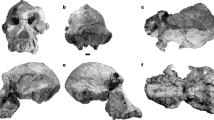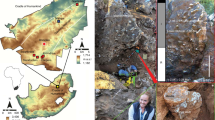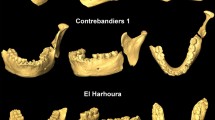Abstract
IN a letter published in Nature1, Prof. S. Zuckerman stated categorically that the lower milk canines of the fossil Australopithecinæ found at Taungs and Kromdraai (Australopithecus and Paranthropus) do not differ “in shape and dimensions, relative and absolute”, from that of the chimpanzee. It appears, however, that this statement was based only on the three overall dimensions of height, length and breadth in a series of fifteen specimens2. We have now repeated our previous comparative studies on fifty immature chimpanzee skulls and have confirmed that the milk canine in this series presents a morphological pattern very different from that of the South African fossils.
This is a preview of subscription content, access via your institution
Access options
Subscribe to this journal
Receive 51 print issues and online access
$199.00 per year
only $3.90 per issue
Buy this article
- Purchase on Springer Link
- Instant access to full article PDF
Prices may be subject to local taxes which are calculated during checkout
Similar content being viewed by others
References
Zuckerman, S., Nature, 166, 158 (1950).
Ashton, S. H., and Zuckerman, S., Phil. Trans. Roy. Soc., B, 234, 485 (1950).
Author information
Authors and Affiliations
Rights and permissions
About this article
Cite this article
CLARK, W. South African Fossil Hominoids. Nature 166, 791–792 (1950). https://doi.org/10.1038/166791a0
Issue Date:
DOI: https://doi.org/10.1038/166791a0
This article is cited by
-
Statistical Methods in Anthropology
Nature (1951)
-
South African Fossil Hominoids
Nature (1950)
Comments
By submitting a comment you agree to abide by our Terms and Community Guidelines. If you find something abusive or that does not comply with our terms or guidelines please flag it as inappropriate.



